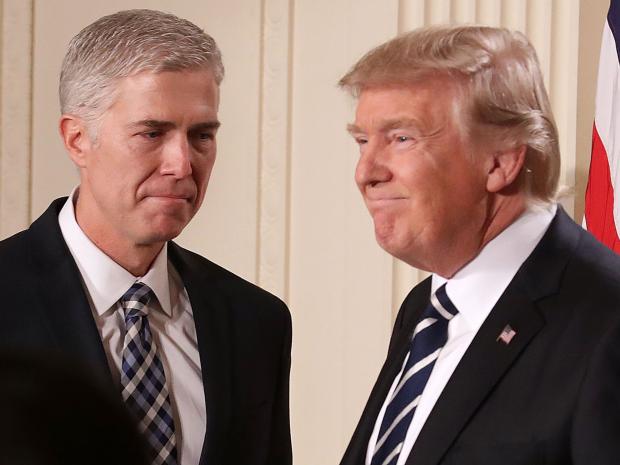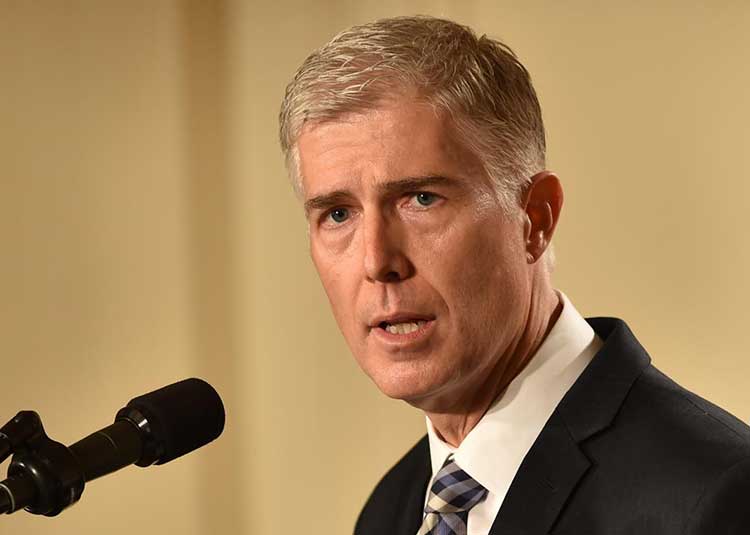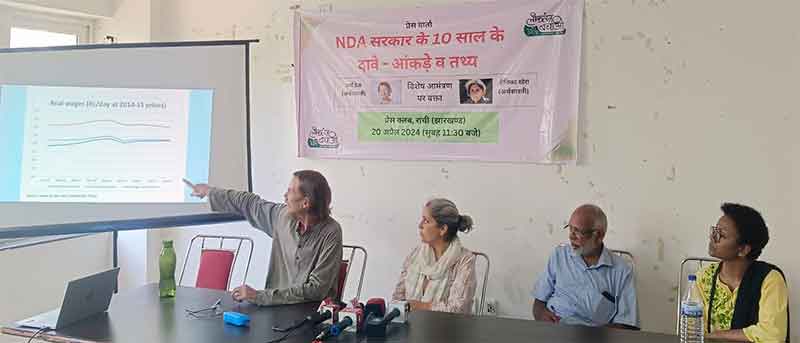
On Tuesday, Donald Trump nominated Neil Gorsuch, a federal appeals court judge from the Tenth Circuit Court of Appeals, to the Supreme Court seat formerly held by arch-reactionary justice Antonin Scalia.
Within Republican circles, the nomination was generally met with approval. Gorsuch was considered by the “mainstream” Republican establishment to have the requisite right-wing credentials, including his proven reactionary record as well as his aristocratic pedigree.
In the prime-time press conference to announce the “winner” of the nomination, during which Trump jarringly assumed the role of the emcee of a reality-TV contest, Gorsuch delivered a few sound bites that clearly signaled his alignment with the reactionary legal tradition embodied by Scalia.
Gorsuch praised Scalia as a “towering judge,” comparing him with Supreme Court justice Robert Jackson (1982-1954), who served as US chief of counsel during the Nuremberg Trials. Gorsuch declared, “Justice Scalia was a lion of the law.”
More than any other figure, Scalia’s name is synonymous with the accelerating rightward march of the American judicial system over recent decades, which featured the dismantling of democratic institutions and protections and the implementation of increasingly reactionary and authoritarian doctrines.
When Gorsuch swears fealty to Scalia’s ghost, he is signaling to the rest of the ruling class his alignment with that trajectory.
The real Scalia was, of course, a bully and a thug. His supposed “genius” consisted of crudely bending the law to fit the predetermined outcome. There was nothing consistent or scholarly in his doctrine of constitutional “originalism.” (See: “The legacy of Antonin Scalia”)
Scalia died on February 13 of last year during a secret Texas retreat with an exclusive aristocratic hunting society called the International Order of St. Hubertus, a Christian “knightly order” that dresses up in green robes decorated with a large cross. The Republican-controlled Senate refused to vote on President Obama’s appointee to fill Scalia’s seat, Merrick Garland, leaving eight justices out of nine on the court ever since.
Gorsuch also went out of his way at the Tuesday press conference to refer to his “faith,” a reminder that the litigation for which he is best known is the infamous 2014 Hobby Lobby case.
In that case, the Supreme Court upheld the religious “right” of corporations to impose Christian religious views on their employees by denying women health care coverage for birth control and abortions. (See: “The US Supreme Court and religion”) The Supreme Court’s opinion in that case, which purported to discover that corporations are entitled to “religious freedom,” was a brazen affront to the principle of separation of church and state.
Gorsuch heard the case when it was before the Tenth Circuit Court of Appeals. He joined the opinion that was later upheld by the Supreme Court, making him a hero in Christian fundamentalist circles. In that opinion, Gorsuch and his colleagues tendentiously rebranded a case of a corporation forcing its religious views on its employees as one of an oppressed Christian family whose sincerely held “religious faith” was being “violated” by the Obama administration.
Given his positions on “religious freedom” in the Hobby Lobby case, some observers have pointed out that Gorsuch would likely side with businesses who refuse to serve customers based on anti-gay bigotry.
Gorsuch has made clear his general contempt for the legacy of the civil rights movement and post-war reforms in American law, which often took the form of judicial interpretations of the Bill of Rights and the Civil War amendments that affirmed legal protections in areas where they had not previously been acknowledged.
In the National Review in 2005, Gorsuch wrote, “American liberals have become addicted to the courtroom, relying on judges and lawyers rather than elected leaders and the ballot box, as the primary means of effecting their social agenda on everything from gay marriage to assisted suicide to the use of vouchers for private-school education. This overweening addiction to the courtroom as the place to debate social policy is bad for the country and bad for the judiciary.”
These conceptions translate into unrestricted judicial warfare against civil rights, voting rights, protections against discrimination, gay marriage, abortion rights and other artifacts of the “liberal social agenda” of the past century.
Meanwhile, when it comes to attempts by Christian fundamentalists to use “the courtroom” as a “means of effecting their social agenda,” Gorsuch is expected to provide his enthusiastic support.
On the question of police brutality, Gorsuch has used the authoritarian doctrine of “qualified immunity” to bar civil rights cases against the police. In 2013, he supported granting immunity in the case of Ryan Wilson, who died after he was tasered in the back of the head and neck by a Colorado police officer. In the same case, the chief judge of the Tenth Circuit, Mary Beck Briscoe, wrote: “A reasonable officer would know that aiming or recklessly tasing Ryan Wilson in the head under the circumstances presented was unconstitutional.”
Gorsuch is an opponent of doctrines requiring “deference” by judges to government regulatory agencies. This issue is worth billions of dollars to the corporations and businesses that seek to evade, for example, environmental protections, since it makes it easier for them to challenge and defeat those regulations in court.
Gorsuch is also an opponent of “overcriminalization” of business, a term that translates to diminished oversight and regulations for corporate executives. “Today we have about 5,000 federal criminal statutes on the books, most of them added in the last few decades, and the spigot keeps pouring,” Gorsuch once wrote. “Businessmen who import lobster tails in plastic bags rather than cardboard boxes can be brought up on charges. Mattress sellers who remove that little tag? Yes, they’re probably federal criminals too.”
While Gorsuch’s positions are extremely reactionary by any objective measure or criteria, within the framework of contemporary American politics his nomination is viewed as a concession to the “mainstream” Republican establishment. His views are not substantially different from those of the numerous George W. Bush appointees sitting on the federal district and appeals courts around the country.
Given the fact that the seat he has been nominated to fill was previously held by Antonin Scalia, the nomination of Gorsuch cannot be said to herald by itself a qualitative shift to the right on that Court.
However, the retirement of one or more of the other sitting judges appears likely during Trump’s four-year term. Justice Anthony Kennedy, 80, is the most likely candidate for retirement. Kennedy, a right-wing Republican appointee, occupies the ideological center of the Court, and often provides the “swing” vote on closely contested (5-4) cases.
Some commentators have noted that Trump’s second appointment to the Supreme Court is likely to be a more radical departure from “mainstream” American right-wing politics. Indeed, among the top three “finalists” from which Gorsuch was eventually selected was Eleventh Circuit Judge William Pryor.
Pryor is a radical extremist judge, even judged by contemporary American standards. He opposes abortion rights, environmental protections, rights for criminal defendants, the separation of church and state, the Voting Rights Act and the Americans with Disabilities Act. He contends that the government should be permitted to execute mentally ill people and has upheld convictions based on racial profiling. And he has argued that the states “should remain free to protect the moral standards of their communities through legislation that prohibits homosexual sodomy.”
Slate columnist Mark Joseph Stern, gathering and summarizing Pryor’s judicial decisions, described him as “a bomb-throwing culture warrior and Republican politician in robes.” The appointment of such a figure to the Supreme Court would constitute a significant further shift to the right in the judiciary and in the American political establishment as a whole.
As for Gorsuch, apologies are already being floated for the capitulation of the Democratic Party on the question of Gorsuch’s appointment. In an op-ed column Tuesday in the New York Times, Neal K. Kaytal, a former acting solicitor general in the Obama administration, argued that Gorsuch “brings a sense of fairness and decency to the job, and a temperament that suits the nation’s highest court.”
The column, which argues for confirmation, is titled, “Why Liberals Should Back Gorsuch.”
Whether the Democratic Party makes a show of opposing the nomination or not, it is expected that Gorsuch will be asked during his confirmation hearings about Trump’s executive orders, in particular last week’s reactionary ban on immigrants from certain Muslim countries. Republican senators will demand to know, directly or indirectly, whether he will uphold these and future presidential decrees.
The author also recommends:
Trump nominates ultra-right justice to US Supreme Court
[1 February 2017]
First published in WSWS.org











































